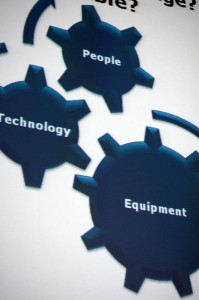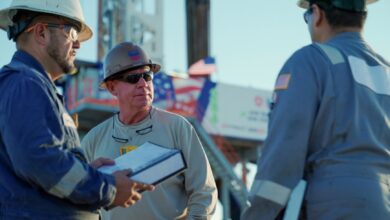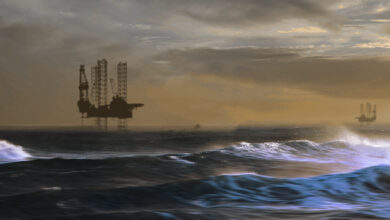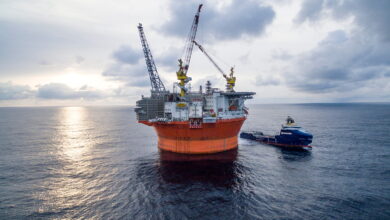Drilling Conference plenary: Creating value through consistency, culture, people
 Consistency, company culture and people were some of the common themes that emerged during the opening-day plenary session at the 2011 SPE/IADC Drilling Conference being held in Amsterdam this week. The discussion focused on how companies can create a sustainable competitive advantage in an era of fast followers. Panelists were Claus Hemmingsen, Maersk Drilling CEO; John Bannerman, Total VP drilling & completions; Pete Miller, National Oilwell Varco chairman, president and CEO; and Satish Pai, Schlumberger Oilfield Services VP worldwide operations. Jan Brakel, Shell International E&P manager wells R&D, moderated the session.
Consistency, company culture and people were some of the common themes that emerged during the opening-day plenary session at the 2011 SPE/IADC Drilling Conference being held in Amsterdam this week. The discussion focused on how companies can create a sustainable competitive advantage in an era of fast followers. Panelists were Claus Hemmingsen, Maersk Drilling CEO; John Bannerman, Total VP drilling & completions; Pete Miller, National Oilwell Varco chairman, president and CEO; and Satish Pai, Schlumberger Oilfield Services VP worldwide operations. Jan Brakel, Shell International E&P manager wells R&D, moderated the session.
Mr Hemmingsen kicked off the discussion by discussing what competitive advantage means to Maersk and commenting that he believes it does pay to be a frontrunner in the industry. “Huge investments, both financially and in terms of manpower and know-how, are required to generate and sustain competitive advantage,” he said.
In the contract drilling industry, he believes that the most sustainable competitive advantage is created by companies that are able to develop and offer integrated solutions that are attractive to their clients. To do this, three criteria must be fulfilled: “Your customers must perceive a consistent difference which creates a value to them. The difference of the contractor or service provider must come from a capability gap between the favored company and its competition. Finally, the product difference and the capability must be sustained over time, or alternatively, renewed frequently,” Mr Hemmingsen said.
Further, although technology plays a critical role in creating competitive advantage, that’s not really where the advantage is gained. “It is the combination of having the right people to operate superior and technologically advanced drilling equipment to generate the economic advantage both for the service provider and for the customer,” Mr Hemmingsen added.
This comment was seconded by Mr Bannerman, who noted that technology can provide only a short-term competitive advantage for a company. “Every technology will be surpassed sooner or later. Understanding the limits of a technology and how to use it where and when necessary is more beneficial,” he said. He believes that it’s the people who can pick the right technology for the right place at the right time who will have the competitive advantage.
From an operator’s perspective, he said, there are three key elements to creating a competitive advantage: knowing what the industry is doing, knowing what your own company is doing, and aligning R&D programs with E&P portfolio needs. “We need to identify what we call within Total technogaps,” Mr Bannerman said.
But perhaps even more important is the people element. “It’s a people business today, and I firmly believe it will be a people business tomorrow. It’s not about controlling the rig site… We need to empower our people on the rig site,” said he added.
Looking at the role of technology in creating competitive advantage, Mr Miller emphasized that safety and reliability are key focus areas. “One thing this industry has not done very well is reduce the number of people as we introduce technology,” he said. By using reliable technology to help reduce the number of people required on rigs, we can also make operations safer because people are taken out of harm’s way.
Mr Miller also noted that we are now in the information age, and he believes that the sustainable competitive advantage will belong to the company that controls information. “But it’s not only controlling that information. It’s how do you get the information and ascertain the veracity of that information,” he said. Being able to get real-time downhole information, interpreting it and using it to improve operations will be especially critical for those who want to get into a well manufacturing mode, such as in shale plays.
Investing in training is another way companies can create competitive advantage. “I think today the biggest sustainable advantage anybody can have are people who know what they’re doing,” Mr Miller said. This advantage might not manifest itself today, “but I assure you it will manifest itself in another five to 10 years. It really is all about people.”
The final panelist, Mr Pai, focused on company culture because he believes that’s what differentiates companies in the long run. Unlike technologies or processes, company culture can’t be easily copied by “fast followers.”
For Schlumberger, the core values of people, technology and profit have not changed since the 1950s, Mr Pai said. The company remains committed to helping employees gain experience all over the world, which means moving people between different job types and different countries. This type of job mobility can be expensive and even risky, as security becomes more of an issue around the world. “We think the only way our people can be differentiated from our competition is we give them this exposure, this experience of working in different parts of the world,” he said.
He also noted that Schlumberger did not cut its R&D budget even during the recent market downturn “because people who have the financial wherewithal to invest in downturns will come out ahead in the upturns. That’s a key part of our strategy,” Mr Pai said. “It’s during these times that the culture or values of the company come out. How you come out of a downturn into an upturn really differentiates companies.”
“In this industry sometimes we introduce complexity without the reliability, and if you do that, you can’t have sustainable advantage,” he said.
Panelists were Claus Hemmingsen, Maersk Drilling CEO; John Bannerman, Total VP drilling & completions; Pete Miller, National Oilwell Varco chairman, president and CEO; and Satish Pai, Schlumberger Oilfield Services VP worldwide operations. Jan Brakel, Shell International E&P manager wells R&D, moderated the session.




